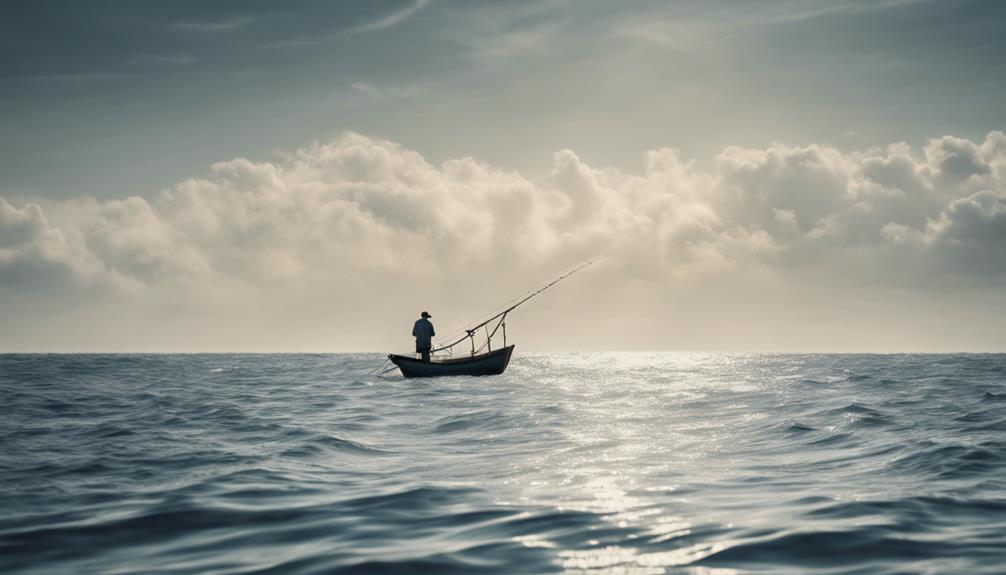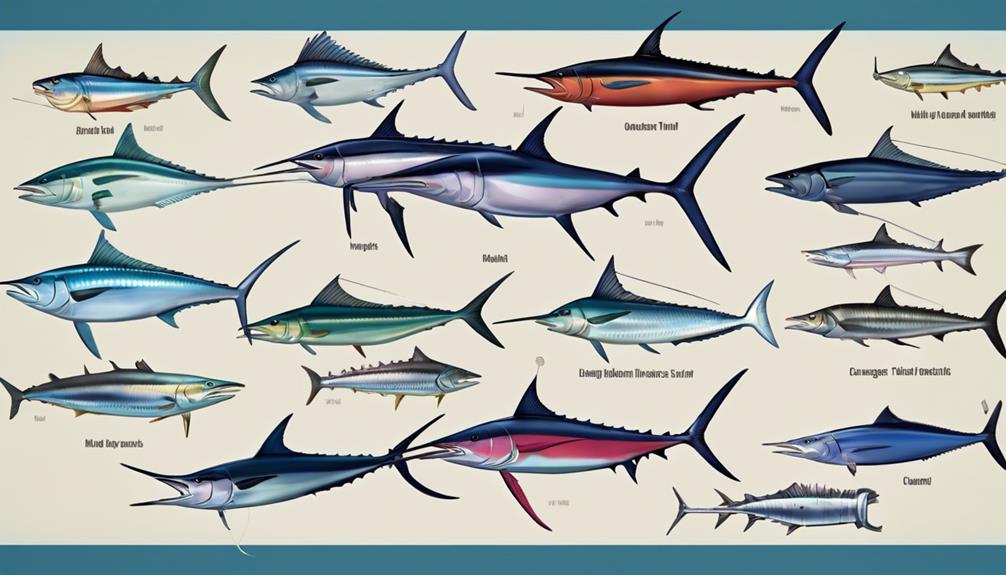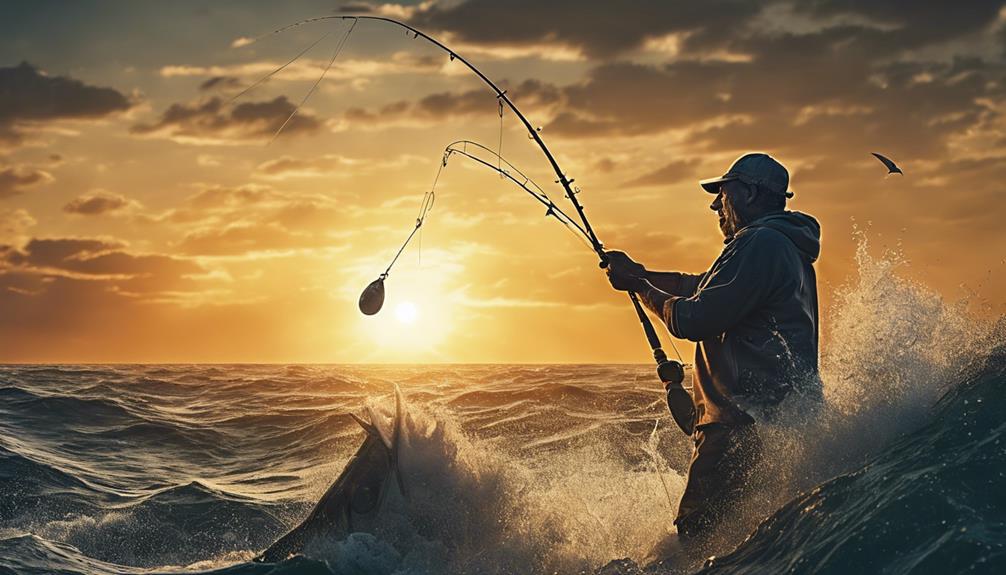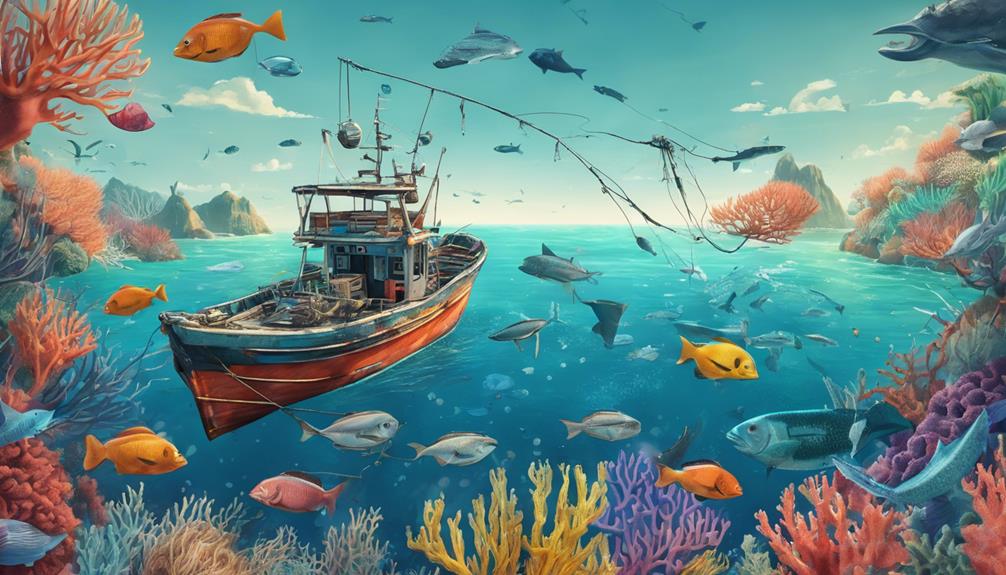If you've ever been out at sea and felt that wave of nausea creeping up on you, you're not alone. Seasickness can quickly turn a deep sea fishing adventure into a miserable experience.
But fear not, there are effective strategies to combat this unpleasant sensation and ensure you enjoy your time on the water. By following some simple tips and tricks, you can increase your chances of having a smooth and enjoyable deep sea fishing trip.
So, what are these strategies, and how can they make a difference for you?
By being prepared and taking proactive steps, such as staying hydrated, avoiding heavy meals, focusing on the horizon, and considering medication or natural remedies, you can significantly reduce the likelihood of seasickness interfering with your fishing expedition. Remember, prevention is key when it comes to combating seasickness, so be sure to implement these strategies before you set sail.
Understanding Seasickness Symptoms
Understanding the symptoms of seasickness can help you prepare and manage discomfort while out on deep sea fishing adventures. Recognizing early signs of seasickness is crucial in effectively managing it before it escalates. Common early symptoms include dizziness, nausea, cold sweats, and fatigue. By being aware of these indicators, you can take prompt action to address them before they worsen.
Managing triggers that can exacerbate seasickness is another essential aspect to consider. Certain factors such as strong odors, looking down at moving water, or lack of fresh air can trigger or worsen seasickness symptoms. To combat this, try to stay on the deck where there's good airflow and focus on the horizon to help stabilize your senses. Avoiding greasy or heavy foods before your trip can also help reduce the likelihood of experiencing seasickness.
Preparing With Proper Medication
To effectively combat seasickness during deep sea fishing adventures, it's essential to prepare with the proper medication. Motion sickness, often experienced at sea, can put a damper on your fishing trip if not properly addressed. There are various medications available to help prevent or alleviate seasickness.
When preparing for your deep sea fishing excursion, consider using over-the-counter medications specifically designed for motion sickness. These medications can help alleviate symptoms such as nausea, dizziness, and vomiting. It's advisable to consult with a healthcare professional before taking any medication to ensure it's suitable for you.
In addition to traditional medications, some individuals opt for natural remedies to combat seasickness. Ginger, for example, has been known for its anti-nausea properties and can be consumed in various forms like ginger candies, teas, or supplements. Peppermint and acupressure bands are also popular natural remedies that some find effective in managing motion sickness.
It is important to start taking the medication as directed before embarking on your deep sea fishing adventure to allow it to take effect. By being proactive and preparing with the proper medication, you can increase your chances of enjoying a seasickness-free fishing experience.
Choosing the Right Spot on the Boat
Opting for a spot near the boat's center can help minimize the effects of motion sickness during your deep sea fishing adventure. Here are three key tips to consider for choosing the right spot on the boat:
- Balancing act: Positioning yourself in the middle of the boat allows you to experience less rocking and swaying compared to the front or back. The center provides a more stable platform, reducing the likelihood of feeling queasy due to excessive motion.
- Motion control: Being closer to the boat's center of gravity can assist in managing the movements caused by waves and currents. This strategic placement can help your body adjust more smoothly to the rhythmic motions of the ocean, decreasing the chances of seasickness.
- Strategic seating: If possible, opt for a seat facing forward. This position can help you anticipate the boat's movements and maintain a better sense of equilibrium. Facing forward allows your eyes to focus on the horizon, aiding in reducing the disorientation that can lead to seasickness.
Choosing the right spot on the boat is a proactive step towards enhancing your deep sea fishing experience. By prioritizing a central location, you engage in a practical approach to mitigate seasickness and maximize your enjoyment on the water.
Eating Light and Staying Hydrated
To combat seasickness during your deep sea fishing adventure, focus on eating light and staying hydrated throughout the trip. When it comes to eating light, opt for easily digestible snacks like crackers, pretzels, or nuts. These snacks can help settle your stomach without weighing you down. Avoid heavy, greasy foods that may exacerbate feelings of nausea. Consider packing some ginger candies or sipping on ginger ale, known for its natural anti-nausea properties.
Hydration plays a crucial role in combating seasickness, so make sure to drink plenty of water throughout the day. Dehydration can worsen symptoms of seasickness, so keep a water bottle handy and take frequent sips. Electrolyte drinks or coconut water can also help replenish lost fluids and minerals.
To enhance your snacking strategies, consider bringing along some sliced fruits like apples or grapes for a refreshing and light option. Trail mix with dried fruits and seeds can provide a good balance of energy without feeling heavy on your stomach. When focusing on hydration hacks, infuse your water with slices of citrus fruits or mint leaves for a refreshing twist. Staying nourished and hydrated can go a long way in preventing seasickness during your deep sea fishing excursion.
Focusing on the Horizon
Keep your gaze fixed on the distant horizon to help alleviate feelings of seasickness during your deep sea fishing expedition. Horizon gazing can be a powerful tool in combating seasickness by providing your brain with a stable reference point amidst the constant motion of the boat. Here are three tips to make the most of this technique:
- Practice mindfulness techniques: As you focus on the horizon, engage in mindfulness by acknowledging the movement of the boat without letting it overwhelm you. Take deep breaths and stay present in the moment, allowing yourself to relax and adapt to the swaying motion.
- Use visual distractions: In addition to the horizon, consider bringing along visual distractions like binoculars or a camera to help shift your focus when needed. By alternating between gazing at the horizon and observing other points of interest, you can prevent feelings of nausea from intensifying.
- Incorporate breathing exercises: While gazing at the horizon, incorporate deep breathing exercises to further promote relaxation and reduce the risk of seasickness. Inhale deeply through your nose, hold for a few seconds, and exhale slowly through your mouth. This rhythmic breathing can help stabilize your body's response to the boat's movements, making your fishing experience more enjoyable.
Engaging in Fresh Air and Deep Breathing
Engage in deep breathing and embrace the fresh sea air to enhance your well-being and combat seasickness during your deep sea fishing adventure. Deep breathing not only calms your mind but also helps stabilize your body's equilibrium. As you stand on the deck, close your eyes, and take slow, deep breaths in through your nose and out through your mouth. Picture yourself in a tranquil place, like a serene beach or a peaceful meadow. Visualization techniques can transport your mind away from the rocking motion of the boat, reducing feelings of nausea.
Incorporating relaxation exercises into your deep sea fishing trip can make a significant difference in how you feel. Try mindfulness practices to stay present in the moment and prevent anxious thoughts from overwhelming you. Focus on the sensations of the sea breeze on your skin and the sound of seagulls in the distance. Positive affirmations such as 'I am in control of my body' or 'I am strong and resilient' can reinforce a sense of well-being and help alleviate seasickness symptoms.
Avoiding Alcohol and Greasy Foods

Opting for non-alcoholic beverages and steering clear of greasy foods can significantly reduce the likelihood of experiencing seasickness during your deep sea fishing adventure. To ensure you have a smooth sailing experience, follow these hydration tips and dietary recommendations:
- Stay Hydrated: Dehydration can exacerbate seasickness symptoms. Make sure to drink plenty of water before and during your deep sea fishing trip. Consider bringing a refillable water bottle to keep yourself hydrated throughout the day.
- Choose Light, Nutritious Meals: Instead of indulging in heavy, greasy foods that can upset your stomach, opt for light and nutritious meals. Foods high in protein, like lean meats and nuts, can help stabilize blood sugar levels and prevent nausea. Incorporating fruits and vegetables into your diet can also aid digestion and provide essential vitamins and minerals.
- Snack Wisely: Pack some healthy snacks for your fishing adventure. Nuts, granola bars, and fresh fruits are convenient options that can keep your energy levels up without causing discomfort. Avoid sugary snacks or foods with strong odors, as they may trigger seasickness.
Considering Alternative Remedies
To further alleviate seasickness during your deep sea fishing adventure, explore alternative remedies that can provide relief from symptoms. Natural remedies like ginger or peppermint can help settle your stomach and reduce nausea. Acupuncture is another option that some people find effective in combating seasickness. This traditional Chinese medicine practice involves inserting thin needles into specific points on the body to promote balance and alleviate symptoms.
Mind-body techniques such as deep breathing exercises or meditation can also help manage seasickness. By focusing on your breath and calming your mind, you may be able to reduce the intensity of your symptoms. Acupressure bands, which apply pressure to a specific point on your wrist, are another alternative remedy worth trying. Some people find relief from nausea and dizziness by using these bands during their deep sea fishing trips.
Experimenting with different alternative remedies can help you find what works best for you when it comes to combating seasickness. Whether it's sipping on ginger tea, scheduling an acupuncture session, practicing mindfulness, or wearing acupressure bands, there are various options to explore. Remember to consult with a healthcare provider before trying any new remedies, especially if you have underlying health conditions or are taking medications.
Frequently Asked Questions
How Can I Prevent Seasickness From Affecting My Enjoyment of the Deep Sea Fishing Experience?
To prevent seasickness and fully enjoy deep sea fishing, try natural remedies like ginger or acupressure wristbands.
Stay mindful and practice breathing techniques to help calm your body and mind.
Focus on the experience and the thrill of the catch, rather than the feeling of seasickness.
Are There Any Specific Strategies for Dealing With Seasickness That Are Not Mentioned in the Article?
When dealing with seasickness, it's helpful to explore natural remedies and breathing techniques. These strategies can provide relief and help you enjoy your deep sea fishing experience more fully.
Natural remedies like ginger or peppermint can calm your stomach, while deep breathing exercises can help you stay relaxed and combat any feelings of nausea.
Can Certain Types of Fishing Boats Be More Prone to Causing Seasickness Than Others?
Certain types of fishing boats can indeed be more prone to causing seasickness than others. Factors such as boat design, like smaller vessels that rock more in the waves, can contribute to this discomfort.
Additionally, weather conditions play a role in exacerbating seasickness, with rough seas leading to a bumpier ride. It's essential to consider these elements when selecting a fishing boat to minimize the chances of experiencing seasickness during your deep sea fishing adventure.
How Long Does It Typically Take for Seasickness Symptoms to Subside Once They Have Started?
When seasickness symptoms kick in, they can last anywhere from a few hours to a couple of days. Natural remedies like ginger and acupressure bracelets may offer relief. Some find medication effective, but it varies by individual.
Deep breathing techniques can also help manage symptoms. Remember, it's essential to find what works best for you to combat seasickness during your deep-sea fishing adventures.
Are There Any Specific Exercises or Techniques That Can Help Alleviate Seasickness While Out on the Water?
When out on the water, trying Deep Breathing and Acupressure Relief techniques can help alleviate seasickness.
Deep Breathing involves taking slow, deep breaths to calm your body and mind.
Acupressure Relief entails applying pressure to specific points on your body, like the wrist, to ease nausea.
These methods may provide relief and make your deep sea fishing adventure more enjoyable. Remember to give them a try and see what works best for you!
Conclusion
Next time you head out on a deep sea fishing adventure, remember these tips to combat seasickness and make the most of your trip.
By understanding the symptoms, preparing with medication, choosing the right spot on the boat, eating light, focusing on the horizon, and engaging in fresh air and deep breathing, you can enjoy your time on the water without feeling sick.
Stay hydrated, avoid alcohol and greasy foods, and consider alternative remedies for a smoother sailing experience.



